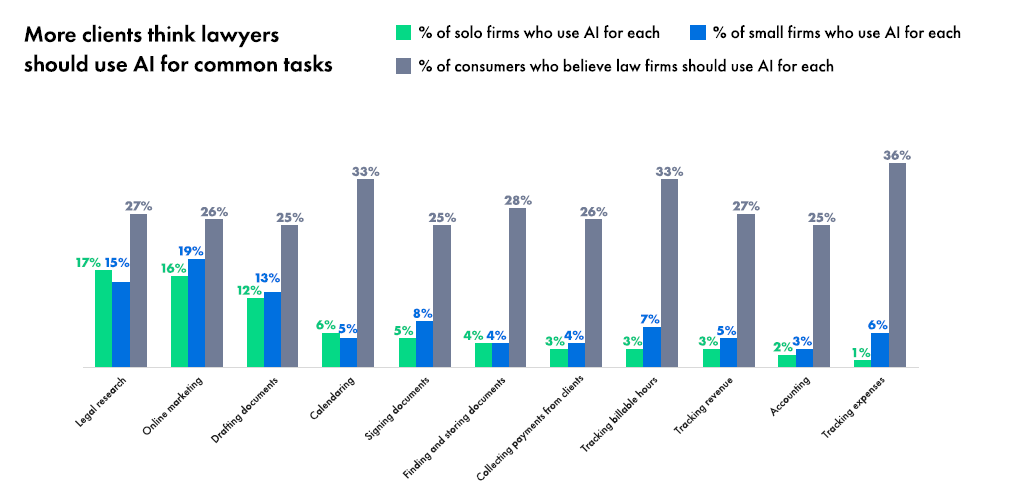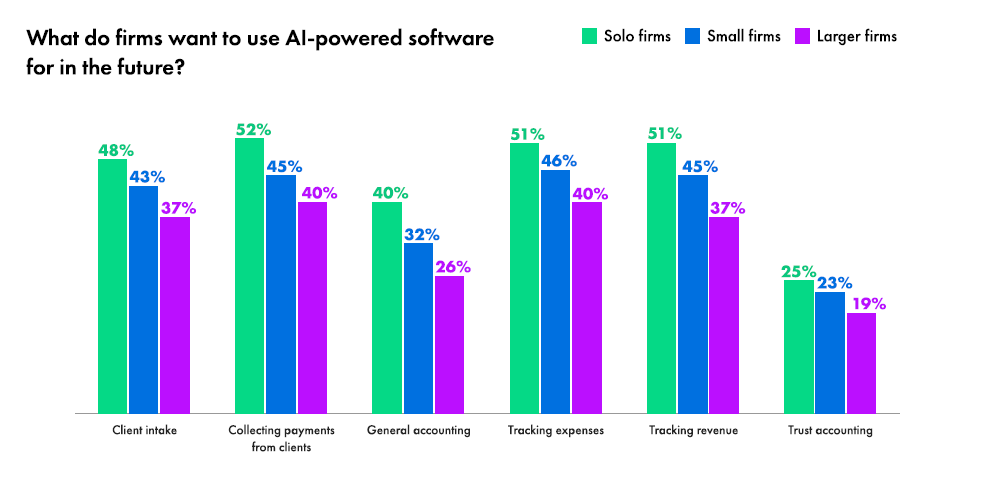[ad_1]
Solo and small agency attorneys intend to undertake synthetic intelligence at a a lot sooner tempo than their larger-firm counterparts, however their purchasers are much more enthusiastic in regards to the expertise, believing it can lead to extra inexpensive and better high quality providers from their attorneys.
So says the 2024 Authorized Traits for Solo and Small Companies report, launched at the moment by the regulation observe administration firm Clio. Based mostly on aggregated knowledge from Clio customers, in addition to a survey of 1,446 authorized professionals from companies of all sizes, and a separate survey of 1,012 U.S. adults, the report examines the state of authorized observe for solo and small companies.
(The report defines a small agency as two to 4 attorneys and authorized professionals. It considers something greater than that to be a “bigger agency.”)
Whereas the report examines a variety of economic and expertise developments throughout solo and small companies, for the primary time this yr, it additionally seemed on the influence of AI on authorized practices. It discovered that attorneys in companies of all sizes stay cautious about using AI of their practices.
“Barely greater than half of attorneys in bigger, small, and solo companies consider that AI isn’t but superior sufficient to be dependable, and just below half of attorneys in these cohorts are additionally practically as more likely to declare that they mistrust AI,” it says.
Even so, the report additionally finds that almost all of attorneys consider that AI’s potential advantages outweigh its prices. Additional, of the authorized professionals surveyed by Clio throughout companies of all sizes, 19% say they’re already utilizing AI in some kind of their practices.
Of those that say they don’t seem to be but utilizing AI, attorneys in solo and small companies are more likely to undertake AI rapidly, with 40% of solos and 35% of small-firm attorneys saying they plan to undertake AI inside the subsequent six months, in comparison with simply 24% of attorneys in bigger companies.
This is smart, the report conjectures, as a result of solos and small companies have leaner operations and fewer sources and may subsequently considerably profit from the automation AI can carry.
“For companies with fewer sources accessible to them, as is usually the case amongst solos and small companies, AI presents great potential to scale their companies and, successfully, punch above their very own weight,” the report says.
Purchasers Favorable to AI
However even because the report finds that many solo and small agency attorneys seem able to undertake AI, it finds that their potential purchasers are much more favorable in direction of the expertise.
Whereas 19% of solos and 20% of these in small companies consider the advantages of AI outweigh the prices, 32% of customers consider this, the report says. Additional:
- 38% of potential purchasers consider that attorneys who use AI-powered software program can supply extra inexpensive providers than those that don’t.
- 32% of potential purchasers consider that attorneys can present higher-quality providers with AI software program.
Throughout particular authorized duties, purchasers are additionally way more favorable to using AI than are their attorneys, as this chart reveals:
“On virtually all counts measured, potential purchasers usually tend to consider that regulation companies ought to use AI for frequent authorized duties starting from advertising and marketing to authorized analysis to billing,” the report says.
What this implies for small companies is clear, the report suggests: Companies that undertake and market their use of AI software program could have a aggressive benefit in advertising and marketing.
Missing Specifics
In studying this report, I discovered it irritating that it by no means defines what it means by AI or what kinds of AI it’s speaking about. Its references to AI are broad and generic. We have no idea whether or not the survey made a distinction between newer types of generative AI and different types of AI which were accessible on the authorized marketplace for years.
That is essential as a result of, if a survey is asking attorneys to self-report on their use of AI, it can not simply assume they perceive both the breadth or nuances of AI expertise. A lawyer who makes use of Westlaw for authorized analysis could deny ever utilizing AI, regardless that Westlaw has integrated AI for many years.
So when the survey says that 19% of attorneys are already utilizing AI, what does that actually imply? What kind of AI are they speaking about once they say that? I feel we’re imagined to learn between the strains and assume the AI at challenge right here is generative AI, however even that may take many types. And if they didn’t spell it out within the report, did they within the survey questionnaire?
Nevertheless, the survey did ask attorneys in regards to the functions for which they wish to use AI-powered software program sooner or later. The chart under reveals the solutions, however the report didn’t say whether or not these had been the one choices within the survey for respondents to pick from. As you may see, it doesn’t embrace what are already frequent makes use of of AI, akin to authorized analysis, summarization and drafting.
Two different findings on AI from the report:
- Practically a 3rd of solo and small agency attorneys (30% and 33%) consider AI software program will make paralegals much less obligatory, whereas solely 23% of bigger agency attorneys suppose this.
- Solely a minority of attorneys are involved about bar restrictions on using AI, with 17% of solos and 21% of small agency attorneys believing that bars won’t ever approve of practices utilizing AI.
Right here once more, this final query begs for better element. Most attorneys have been utilizing AI in some kind, even when only for authorized analysis, for many years, with none suggestion that bars would prohibit it. So, clearly the query has some particular sorts or functions of AI in thoughts, however the report presents no clarification.
A Distinctive Alternative
The underside line of this report’s findings on AI is that it presents a singular alternative for solo and small agency attorneys to do extra with much less.
“For solo and small companies particularly, AI presents a exceptional alternative to automate frequent duties which will in any other case require extra sources or take day out of a lawyer’s busy day and permit them to develop their capacity to carry out authorized providers.”
A remaining observe on the report: It covers rather more than AI and is price studying for anybody keen on developments in regulation observe amongst solo and smaller-firm attorneys. Another key takeaways:
- Solo and small agency attorneys face challenges from lockup – unbilled work in progress, uncollected debtor accounts, and different unbilled and uncollected cash.
- Solos’ billing charges are usually not maintaining with will increase within the client worth index.
- Billing and collections are sturdy amongst solo and small companies, however their billable hours are dropping.
- Solo and small agency utilization charges are rising, however trailing behind these of bigger companies.
- Assortment charges are bettering for companies of all sizes, however not by a lot.
You’ll be able to obtain the total report at no cost from Clio at clio.com/ltr.
[ad_2]
Source link



